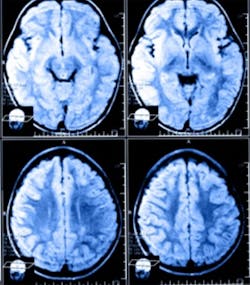Software analyzes MRI scans
Software created by Dr. Robin Wolz and Professor Daniel Rueckert from the biomedical image analysis group in the department of computing at Imperial College London (London, UK) could slash the time it takes for doctors to diagnose Alzheimer's disease from 18 months to three months.
The researchers say the time the new system could save is critical to the effectiveness of treating diseases such as Alzheimer's. This is due to the fact that existing drug treatments are most effective in the diseases' earliest stages.
The size of the parts of the brain important for memory such as the hippocampus and amygdala steadily decrease as Alzheimer’s progresses. Doctors use this as an indicator of how far Alzheimer’s has progressed in patients. Currently, doctors have to work out what is happening to the structure of the hippocampus using an MRI scan. But this is a painstaking, costly and time-consuming process, where doctors have to analyze the 3-D scan slice-by-slice.
Dr. Wolz's software, on the other hand, performs that task automatically, examining MRI brain scans and measuring the volume of specific brain structures like the hippocampus and amygdala rapidly and accurately.
"Our automated technology could lead to quicker treatments for patients and improve their quality of life," says Dr. Wolz, who received his PhD from Imperial College London in medical image analysis.
Related articles on MRI from Vision Systems Design.
1. Arterial spin labeling technique uses MRI to diagnose Alzheimer's
Researchers from the Perelman School of Medicine at the University of Pennsylvania (Philadelphia, PA, USA) are using a magnetic resonance imaging (MRI) technique called arterial spin labeling (ASL) to diagnose Alzheimer's disease.
2. New MRI technique more accurately detects lung cancer
A new type of magnetic resonance-based diagnostic imaging can differentiate benign lung lesions from those that are cancerous more accurately than PET-CT scans.
3. Algorithm cuts down MRI scan time
The time taken to perform a magnetic-resonance-imaging (MRI) scan could be cut from 45 minutes down to just 15 minutes, thanks to a new algorithm developed at the Massachusetts Institute of Technology (MIT; Cambridge, MA, USA).
-- Dave Wilson, Senior Editor, Vision Systems Design
